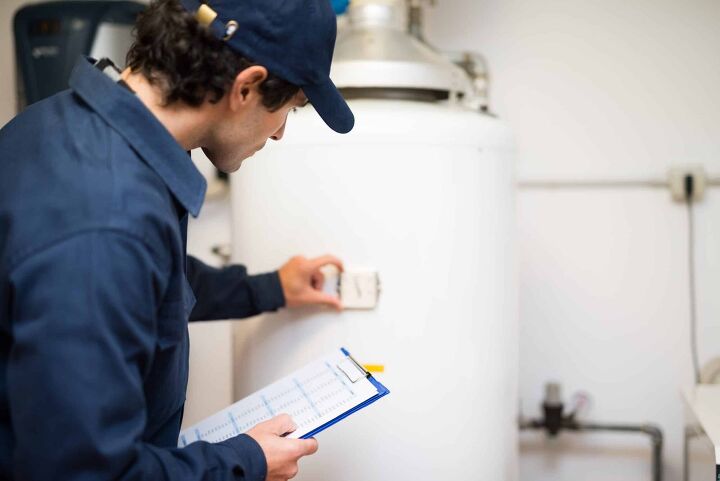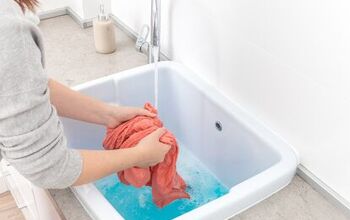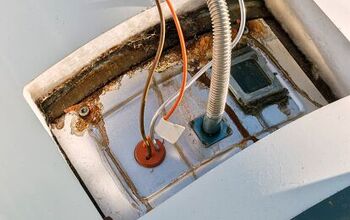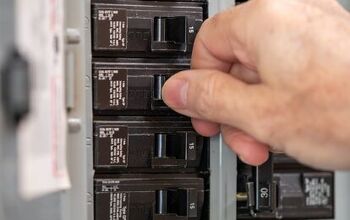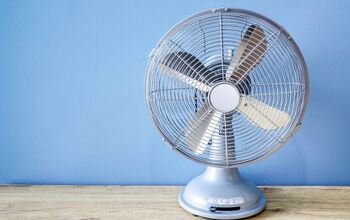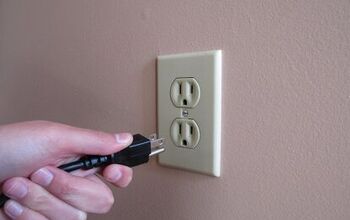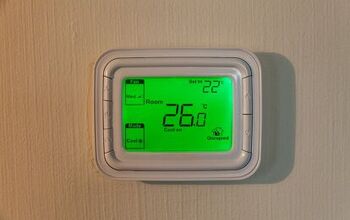What Are The Signs Your Hot Water Heater Is Going Out?

There’s something super relaxing about a warm bubble bath or a hot shower. But, when your water runs cold after a few moments or never gets hot at all, it’s anything but relaxing. When your water heater goes bust, it can be a considerable inconvenience.
You can tell that your water heater is going out if rusty water comes out of it or you hear rumbling sounds. Look for pools of water near the water heater if you suspect that your water heater may have gone bad. Water heaters can last 10-15 years before they go bad.
You use hot water every day to do all sorts of things, like washing dishes and laundry, taking a shower, and cleaning your house. If your water heater is going bust, then it’s understandable to want a heads up as soon as possible.
Knowing these five signs of a failing water heater can help keep your water nice and hot.
Do You Need Water Heater Repair Services?
Get free, zero-commitment quotes from pro contractors near you.

Five Signs Your Hot Water Heater is Going Bust
If your water heater isn’t giving you the hot water you desire, check for these tell-tale signs that could indicate you need a new unit:
1. Rusty Water Coming from Your Water Heater
If you spot rusty water coming from your tank, it could be a sign that your water heater’s interior is rusting. Eventually, this rust will cause leaks.
However, rusty water can also come from rusty, galvanized pipes, so test things out first. Drain several 5-gallon buckets from your water heater and observe the color of the water. If, after three buckets your water is still rusty, the problem is likely with your water heater.
2. Rumbling Sounds Coming from Your Water Heater
Over time, sediment that builds up in your tank hardens and makes it more difficult for your water heater to operate. When your water heater heats up, you will start to hear banging or rumbling noises.
Sediment also causes more wear and tear to your water heater, leading to small cracks and holes. If your water heater starts to shake, rattle, and leak, it’s about to kick the bucket.
3. Moisture or Water Around Your Water Heater
If there is moisture around your water heater, there could be a leak or small crack in the tank. When the metal heats up it expands, causing water to leak from these small fissures.
Before you jump to replacing your water heater, make sure that all of your connections and fittings are dry. If your joints are leaking, this could signal a simpler, less costly matter than a busted water heater.
4. Your Water Heater Is Old
If you don’t notice any specific issues with your water heater, but it’s over 10 years old, be prepared. You could potentially start seeing some signs of failure soon.
If you notice any of these signs and your water heater has been around for a long time, it’s time to start shopping.
5. Cold Water
If you no longer get hot water, especially if the water runs ice-cold, this could signal your hot water is at its end. If cold water is the only issue you notice, check for the simple fixes first. But, if your unit is up in years, it’s likely time to say farewell.
No Hot Water Doesn’t Automatically Point To a Failing Water Heater
Water running lukewarm or cold is a sign that something is likely amiss with your water heater. However, low-temps alone don’t necessarily mean your unit is failing.
You could be losing out on hot water for several reasons. The temperature setting on your unit could be set low, or your water heater could be too small for your home and needs. Your water heater could also have a faulty thermostat or defective heating element.
If you have an electric water heater, check to see if it is still plugged in or check your breakers. Sometimes, things really are that simple.
Some of these problems can be solved with basic fixes, while others might require more time and cost. Of course, there is always the worst-case-scenario — that you need to replace your water heater.
What If Your Pilot Light Keeps Going Out?
You might discover that the reason for your chilly showers is a pilot light that won’t stay lit. If this is the case, depending on the exact issue, you might not need to replace your water heater yet.
The pilot light is the heart of your gas water heater; it’s a small blue flame that burns gas to make heat. A pilot light should be a steady, blue flame. If the light isn’t lit, you get no hot water.
Your pilot light can go out for several reasons:
- The pilot tube that supplies gas to the pilot light might be clogged.
- The thermocouple could be dirty, broken, or bent. The thermocouple closes the gas valve when the pilot light is off to protect against gas leaks.
- The flex tube is dirty or clogged. The flex tube connects the pilot light and thermocouple to the gas controller. If it is clogged, it can’t supply gas to the burner.
- The main control valve is not working properly. This is not a very common problem, but it can happen. The main control valve regulates your gas and water pressure.
How To Fix a Pilot Light That Won’t Stay Lit
Depending on what the issue is with your pilot light, you might be able to fix it yourself.
Note: Before you try to diagnose the problem, turn off the main gas valve, and wait at least five minutes.
Step 1
If it is a clogged pilot tube, use a slim needle to gently clean the tube. You might have to do this process several times until the tube is cleaned completely.
Step 2
Is something wrong with the thermocouple? If it is a dirty thermocouple, use a piece of sandpaper to scrub off any dirt and muck. If the thermocouple is bent, bend it back into position so that it wraps around the blue flame.
If the thermocouple is broken, your best course of action is to replace it.
Step 3
If the problem is not with the pilot tube or thermocouple, then check the flex tube. If the flex tube is twisted or bent, straighten out any kinks and check for any possible damage. If the tubing is damaged this can cause gas leaks.
You might need to replace the tubing or call a pro to do it for you.
Step 4
If none of the above problems solve your pilot light issue, it could be the main controller valve, though this is rare. There is no DIY solution to repair this, you will need to replace the part or have an expert do it.
Related Questions
How long does a water heater usually last?
A typical water heater lasts for an average of 10 to 15 years, depending on how well it is maintained and where you have it installed. If you are not sure how old your water heater is, check the paperwork or any applicable warranty information. You might also be able to tell the age of your water heater from the serial number. Some codes begin with a letter that represents the month a unit was manufactured, followed by two digits that represent the year.For example, the code C062458901 represents a water heater manufactured in March of 2006. (March is the third month of the year, and C is the third letter in the alphabet.) In other serial numbers, the first two digits represent the month and the second two numbers show the year. There are several different configurations within serial numbers that can show the manufacture date. Different manufacturers use different codes, so check your water heater’s manufacturer’s website for more details.
Do tankless water heaters last longer than traditional storage tank heaters?
According to the Energy Department, tankless water heaters can last for up to 20 years.
How much is a new water heater?
New water heaters usually cost between $450 to $1,600 for standard models, depending on brand, heat source, and size. Certain units could cost over $5,000 when you start adding in more components.Gas models usually cost slightly more than electric models, but gas units are less costly to operate. Electric models typically cost less and are easier to install, but they can cost more to operate over the long-term.Tankless water heaters cost more initially, but they cost less to operate and provide you with endless hot water. However, depending on the unit, a tankless heater might be better suited for smaller households.
Does the lifespan of a water heater vary based on whether the unit is electric or gas?
The average life expectancy of a water heater is about the same for gas and electric heaters.
Should you try to fix a failing water heater?
If the problem requires a simple fix and you are confident in your DIY skills, you might be able to fix your water heater. However, if the repair is more complicated or you are unsure of what to do, it is best to call a licensed plumber to handle it.
Can you install a water heater yourself?
You can, but you still must adhere to strict codes and guidelines. Unless you are very familiar with your local plumbing code, hiring a professional to do the job is a better option. Plus, in many cases, if you don’t use a licensed installer, the manufacturer will void your warranty.
How should you maintain a water heater?
One of the best ways to maintain your water heater and extend its life is to drain it regularly. Over time, sediment can build up in the tank and form a sludge that settles in your water. Flushing out your unit can help improve your water heater’s performance. You can refer to your water heater’s manual for specific instructions and guidelines. Typically, the more people who live in your home, the more often you should flush and inspect your water heater.
Do electric water heaters have pilot lights?
Electric water heaters do not have a pilot light like gas heaters. In other words, there is no blue flame that burns gas. Electric heaters use electric currents to heat the water. However, electric water heaters do have an indicator light. This indicator light glows green to signal the unit is on and red signals that the water is hot.
Do You Need Water Heater Repair Services?
Get free, zero-commitment quotes from pro contractors near you.

Wrapping Up
If your water heater is starting to lose its heat, it isn’t necessarily going bust. Sometimes, lukewarm or cold water can point to more straightforward issues like a temperature setting that is too low, a bad connection, or a faulty thermostat.
If your water heater fails, you’ll likely notice several other signs before your unit dies completely. If you see rusty water, moisture around the tank, or hear rumbling noises, your water heater is likely in critical condition.
If your hot water heater is older than ten years and showing these signs, consider replacing it soon. When it comes to water heaters, you definitely want to keep things hot!

Stacy Randall is a wife, mother, and freelance writer from NOLA that has always had a love for DIY projects, home organization, and making spaces beautiful. Together with her husband, she has been spending the last several years lovingly renovating her grandparent's former home, making it their own and learning a lot about life along the way.
More by Stacy Randall



